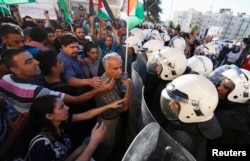UNITED NATIONS —
A senior United Nations official on Monday urged Israel to exercise restraint in its search for three missing teenagers it accuses the Hamas Islamist group of kidnapping, while warning the Security Council that violence in the region could escalate.
Israel's army said it had detained another 37 Palestinians overnight as it searched and extended a crackdown on Hamas, which has denied having any knowledge of the missing teens. The Israeli military says it has detained 361 people since the Israeli students went missing on June 12.
"As the search for the missing youth continues, we call for restraint in carrying out the security operations in strict compliance with international law, and avoiding punishing individuals for offenses they have not personally committed," U.N. political affairs chief Jeffrey Feltman said.
"The rising death toll as a result of Israeli security operations in the West Bank is alarming," he told the Security Council during a monthly meeting on the Middle East.
The crisis has aggravated tensions in the West Bank which, along with East Jerusalem and the Hamas-controlled Gaza Strip, the Palestinians want as part of a future state.
After his public briefing, Feltman spoke to the council behind closed doors. He warned the 15-nation body there could be a new Palestinian intifada, or uprising, against Israel.
"The situation on the ground is very bad," Feltman was quoted as saying by a council diplomat in the room, who spoke to Reuters on condition of anonymity. "I fear we might get to the point of a third intifada."
Other diplomats confirmed Feltman's closed-door warning.
Council members also attempted to agree on a statement to the press to condemn the alleged kidnapping of the Israelis.
Russia's U.N. Ambassador Vitaly Churkin presented a draft statement but diplomats present at the meeting said both Jordan and the United States proposed amendments.
It soon became clear, diplomats said, that the U.S. and Jordanian delegations would be unable to agree on a mutually acceptable statement to the media. Washington, Israel's traditional protector on the council, wanted no condemnation of Israel while Jordan demanded a tough rebuke of the Jewish state.
"Unfortunately members of the Security Council were not able to find common ground," Churkin told reporters. "Some delegates want to have very strong language condemning Israel, another delegation did not want to have any reference to Israel at all."
Council statements must be approved unanimously.
Israel's U.N. Ambassador Ron Prosor issued a statement after the council meeting defending Israeli actions aimed at finding the missing teenagers.
"Some nations behave as if Israel should roll out the welcome mat for Hamas," he said. "Israel will not allow this terrorist group to trample on its citizens. Israelis are acting in self-defense to defend our nation from the terrorist networks that surround us." The Permanent Observer for the Palestinian territories, Riyad Mansour, condemned the "massive aggression against our people in the Occupied Palestinian Territory."
Israel's army said it had detained another 37 Palestinians overnight as it searched and extended a crackdown on Hamas, which has denied having any knowledge of the missing teens. The Israeli military says it has detained 361 people since the Israeli students went missing on June 12.
"As the search for the missing youth continues, we call for restraint in carrying out the security operations in strict compliance with international law, and avoiding punishing individuals for offenses they have not personally committed," U.N. political affairs chief Jeffrey Feltman said.
"The rising death toll as a result of Israeli security operations in the West Bank is alarming," he told the Security Council during a monthly meeting on the Middle East.
The crisis has aggravated tensions in the West Bank which, along with East Jerusalem and the Hamas-controlled Gaza Strip, the Palestinians want as part of a future state.
After his public briefing, Feltman spoke to the council behind closed doors. He warned the 15-nation body there could be a new Palestinian intifada, or uprising, against Israel.
"The situation on the ground is very bad," Feltman was quoted as saying by a council diplomat in the room, who spoke to Reuters on condition of anonymity. "I fear we might get to the point of a third intifada."
Other diplomats confirmed Feltman's closed-door warning.
Council members also attempted to agree on a statement to the press to condemn the alleged kidnapping of the Israelis.
Russia's U.N. Ambassador Vitaly Churkin presented a draft statement but diplomats present at the meeting said both Jordan and the United States proposed amendments.
It soon became clear, diplomats said, that the U.S. and Jordanian delegations would be unable to agree on a mutually acceptable statement to the media. Washington, Israel's traditional protector on the council, wanted no condemnation of Israel while Jordan demanded a tough rebuke of the Jewish state.
"Unfortunately members of the Security Council were not able to find common ground," Churkin told reporters. "Some delegates want to have very strong language condemning Israel, another delegation did not want to have any reference to Israel at all."
Council statements must be approved unanimously.
Israel's U.N. Ambassador Ron Prosor issued a statement after the council meeting defending Israeli actions aimed at finding the missing teenagers.
"Some nations behave as if Israel should roll out the welcome mat for Hamas," he said. "Israel will not allow this terrorist group to trample on its citizens. Israelis are acting in self-defense to defend our nation from the terrorist networks that surround us." The Permanent Observer for the Palestinian territories, Riyad Mansour, condemned the "massive aggression against our people in the Occupied Palestinian Territory."






